- Home
- Alex Archer
Eternal Journey
Eternal Journey Read online
Who’s involved with this? Annja wondered.
Someone beyond the university, certainly, otherwise she wouldn’t be the target of Arab martial-arts masters. University of Sydney professors didn’t strike her as the types to bring in hired assassins.
She stepped into another chamber, this one much smaller than the first one. It smelled ghastly, and a pan of the light showed why. The ceiling had spiderweb cracks in it. Water had trickled through and ruined the goods arrayed on the floor—long-rotted animal hides, bodies wrapped in cloth, which from their outlines looked to be nothing more than skeletons, jars that had been filled with grain and other foodstuffs and that now contained only mold.
“Ugh,” Annja pronounced. Now it was definitely time to leave.
She spun and blinked furiously, meeting another beam of light—this one aimed right at her eyes.
“Put your flashlight down and put your hands up!”
Because the light had practically blinded her, Annja couldn’t see the speaker, but she guessed it was the man she’d followed. He’d gotten behind her and hidden, waited for the right time to approach.
“Drop it now!” he ordered.
Annja had no choice but to comply.
Titles in this series:
Destiny
Solomon’s Jar
The Spider Stone
The Chosen
Forbidden City
The Lost Scrolls
God of Thunder
Secret of the Slaves
Warrior Spirit
Serpent’s Kiss
Provenance
The Soul Stealer
Gabriel’s Horn
The Golden Elephant
Swordsman’s Legacy
Polar Quest
Eternal Journey
Rogue Angel™
Alex Archer
ETERNAL JOURNEY
Special thanks and acknowledgment to Jean Rabe for her contribution to this work.
THE LEGEND
…THE ENGLISH COMMANDER TOOK
JOAN’S SWORD AND RAISED IT HIGH.
The broadsword, plan and unadorned,
gleamed in the firelight. He put the tip against
the ground and his foot at the center of the blade.
The broadsword shattered, fragments falling
into the mud. The crowd surged forward,
peasant and soldier, and snatched the shards
from the trampled mud. The commander tossed
the hilt deep into the crowd.
Smoke almost obscured Joan, but she continued
praying till the end, until finally the flames climbed
her body and she sagged against the restraints.
Joan of Art died that fateful day in France,
but her legend and are sword are reborn….
CONTENTS
PROLOGUE
CHAPTER 1
CHAPTER 2
CHAPTER 3
CHAPTER 4
CHAPTER 5
CHAPTER 6
CHAPTER 7
CHAPTER 8
CHAPTER 9
CHAPTER 10
CHAPTER 11
CHAPTER 12
CHAPTER 13
CHAPTER 14
CHAPTER 15
CHAPTER 16
CHAPTER 17
CHAPTER 18
CHAPTER 19
CHAPTER 20
CHAPTER 21
CHAPTER 22
CHAPTER 23
CHAPTER 24
CHAPTER 25
CHAPTER 26
CHAPTER 27
CHAPTER 28
CHAPTER 29
EPILOGUE
PROLOGUE
Henenu’s heart raced as he watched the slab fall and split, so much of it crumbling into worthless gravel. He swore that he could feel the last pulse leaving his body as he dropped to his knees, eyes locked on the ruined stone. The prayer that he’d painstakingly carved on its polished surface to honor the mistress to the entrance of the valley was destroyed.
All those long, long hours wasted.
His brother and five other men had been fitting the slab in place above the temple entrance. It was to be the crowning piece to the structure they’d all labored so hard to build.
“Fools, you!” Henenu spit when he regained his breath. “The mother goddess curse you all and send your souls to a dark place for your clumsiness!” Then softly he added, “Curse the lot of us for coming to this escapeless hole.”
He ground his fist against the earth so hard his knuckles bled, closed his eyes and begged the mother goddess’s forgiveness. He promised to carve another, more magnificent slab—one that would be placed by all of his men. There would be no risk of failure next time.
“A fool, me,” he said. Henenu directed his anger inward now. “The fault is with me. The blame is all mine.”
Perhaps the mother goddess was furious that they had spent their time erecting buildings rather than trying to get home. No, Henenu thought, they had tried so often to rebuild the boats and sail away, and had been thwarted at each attempt.
Perhaps this temple was not large enough, and in her irritation at the slight the mistress to the entrance of the valley had caused the stone to break, displaying her displeasure.
Certainly this was not as large as her temple in Henenu’s home city. He looked at the building through narrowed eyes, seeing the sharp angles and planes and the squat, wide steps that led up to an entranceway that yawned black like the maw of a hungry beast. It was a beautiful building.
Again he stared at the broken slab and felt his chest grow tight.
Stone was plentiful in this land, and so Henenu could order more pieces cut, knock down a wall and make the temple larger. That might appease the mother goddess. But his men were not as numerous as the builders he’d commanded back home. It had taken several years to accomplish this much.
And what would appeasing the goddess bring them?
A bigger temple would not grant the promise of a rich afterlife. This land they’d found would forever prevent them from joining the gods.
This land would consign them to the abyss.
“Brother.” Khentemsemet had come down the temple steps and stood in front of Henenu, bowing respectfully and blocking the view to the entrance and the ruined slab. “The responsibility—I take it, Henenu. My fingers ached in weakness, and I lost my hold on the prayer stone. I will accept whatever punishment you—”
Henenu rose and shook his head, looked around his younger brother and to the temple entrance again. His ire had cooled somewhat, seeing Khentemsemet’s penitent face and tear-filled eyes, and he let out a low breath that sounded like dry leaves rustling in a lazy wind. “No punishment, brother. I will carve another slab.”
“The mother goddess…”
“It was merely a piece of rock, dear Khentemsemet.”
“But, Henenu…”
“The next prayer I inscribe to Hathor, our mother goddess, will be more eloquent,” Henenu said. “In it I will pay better homage to she who is the wife of Horus. She is our only mother goddess.”
Khentemsemet’s shoulders relaxed and he turned to regard the temple, his eyes avoiding the broken stone. The setting sun painted the walls a molten bronze, and the shimmering waves of heat that rose from the ground made the carved images on the building’s sides appear to move. The majority of creatures and the men and women depicted had cows’ heads or ears or horns. Hathor’s was the largest. Her bovine visage was enfolded in a sun-shaped disk, and her arms stretched up as if she were trying to grab her beloved Horus, the god of the sky and the noon sun.
Similar figures were displayed on the handful of smaller buildings that spread away to the north, the etchings all deep, as there was little age to the structures
and the wind had not had a proper chance to weather the stone.
A few of the images on the temple were incongruous to the rest; they were smaller than the carved Egyptian deities, and they formed a line like a border along the base. They were of quadrupeds with large, muscular back legs, tiny front legs, long tails, and pouches where young ones poked out their heads.
Henenu and Khentemsemet looked to the west to see a quartet of the sun-tinged animals hop across the horizon.
“This escapeless hole,” Henenu pronounced again. “It will keep us from ascending.”
1
A wide-brimmed hat the color of wet sand shielded the archaeologist’s eyes from the sun and made it difficult for the cameraman to get a good shot of his face. The man worked steadily and carefully, sifting dirt and picking out what looked like unremarkable shards of pottery, all the while oblivious to the film crew around him.
“Wes, look up once in a while, okay?” Annja Creed stood back far enough so her shadow would not encroach. “We’ve been over this a few times,” she reminded her colleague.
“Yeah, yeah. No worries.” The archaeologist tipped his head up and smiled, showing an even row of bright white teeth that contrasted sharply with his well-tanned skin and scruffy beard. He winked at her.
“Ah, sometimes I don’t know Christmas from Bourke Street, Miss Creed,” he replied. “I get my head into this and I forget all else.”
Annja put Wes somewhere between thirty-five and fifty, his hair graying, but his face unlined and his eyes bright. He was dressed in the traditional khaki pants most archaeologists wore, but his shirt was a brilliant lake-blue, new and with sharp creases; he’d worn a new shirt each day of the shoot, and had polished his shoes. He’d stubbornly refused to give his age and many other details about his personal life, saying, “I don’t need the world to know all of that, Miss Creed. I’m not important. This site is, though.”
She could have gotten all the biographical information she wanted for her piece from the foundation funding the dig—about Dr. Wesley Michaels, his wife and the handful of other archaeologists. She could have gotten Wes’s age, weight, favorite beverage, and even the name of his first pet if she’d pressed. But he was right…the site deserved the spotlight.
“Besides, don’t you have enough pictures of me, Miss Creed? I thought you finished up yesterday.” Wes gave her another wink and returned to his sifting, the angle of his hat again obscuring his face.
Annja loved to hear Wes talk. He had a thick Australian accent, perhaps exaggerated for her benefit.
“Just about finished, Dr. Michaels,” the cameraman pronounced. “A few more pans, Annja, and it’ll be a wrap, as they say.”
“Thanks, Oliver.” Annja pointed to the north. “Could you get some more on the skeletons, please. That fellow working over there by himself. He’s uncovered quite a bit this morning. You can see the whole skull now.”
Oliver made a face. “More bone shots. Sure.”
The archaeologists labored in a long bowl-like depression, concentrating on a section of midden at the base of a hill, a layer of soil that was stained dark by the decomposition of refuse left behind by people who lived a long time ago. The southern section had fragments of stone tools, bits of crude jewelry and pottery chips, the latter of which obviously fascinated Wes. He was attentive with even the smallest piece.
Annja watched him with detached envy. It was a fascinating dig, and a part of her wished she was working it, not just hosting a television segment highlighting the site. Three and a half days of filming and interviews for a one-hour slot on Chasing History’s Monsters. She held back a laugh; there’d been no monsters here in this desolate stretch in a forest preserve northwest of Sydney, but she knew her producer would fabricate one. He’d come up with some beast that supposedly either lured the ancient Egyptians to Australia or prevented them from leaving—some creature that had enough myths and legends swirling around it to attract good viewing numbers.
The features of the midden drew Annja’s thoughts back. Discolorations spoke of the human impact here, such as spots where posts had been set for houses and hearths had been dug for cooking. Most fascinating were the unearthed stones covered with carvings.
Egyptian hieroglyphs, these archaeologists were certain. Others disputed it, claiming they were merely unusual aboriginal petroglyphs. She’d seen plenty of petroglyphs in books and on various Internet sites, and pictographs—paintings on rocks that usually held some religious meaning. She had to side with Wes. They certainly did look like Egyptian hieroglyphs. One of the more distinct carvings was of a slight woman with the head of a cow. One of her arms was stretched above her head; the other arm had been chopped off when the stone broke.
“Hathor,” Wes had explained. “The wife of Horus. She was an ancient goddess, dating to dynastic times, maybe earlier. Nothing aboriginal about her and Horus.”
Annja and her crew had agreed not to give the exact location of the dig. Wes and the foundation had been adamant about that. They had enough problems with errant hikers trudging over out of curiosity. Too much publicity would mean they’d have to up their security to protect against looters and tourists, and that would cut into what Wes called a “damn scant budget.”
There was a second dig about a mile away, on the other side of the ridge in a lightly wooded section. Smaller and not nearly as interesting as this, Annja thought, though certainly part of the same ancient city. University of Sydney graduate students were working there to uncover more hieroglyphs. A third Egyptian dig was taking place near Brisbane, and Annja had lobbied to visit that site, too, as it was the most recent. But her producer cited timing and money, and so she had grudgingly settled solely on Dr. Michaels’s team.
“This is all considered fringe archaeology anyway,” Doug Morrell had argued, because not all the experts agreed it was Egyptian. Not worth too much airtime, but certainly worth some, he had said. Normally, the hint of some monster triggered her assignment. This time, it was a leak that a rival television show was going to send a team to the dig. Doug had admitted wanting the scoop on the place.
Annja breathed deep, smelling the age of the things being unearthed, the dryness of the ground and the tinge of sweat from the archaeologists. She thought maybe she’d come back here on her own before the year was out and see what progress had been made.
Wes Michaels hoped to get the results of some radiocarbon dating before Annja and her crew finished. Using the known half-life of carbon 14, and measuring the amount of undecayed carbon in a plant specimen his wife had uncovered at the bottom of a bowl, Wes hoped to determine the age of the features of this site. Annja knew geochronology would also help—dating artifacts by the age of the geological formation they were discovered in. But those test results were still hanging.
Wes had explained to Annja that a handful of curators and computer programmers were cataloging what had already been taken away from the site and were storing them in a museum in Sydney. He had offered to show her some of the more interesting specimens locked away there. She thought maybe she’d take him up on that during her return trip.
“Fringe nothing, Miss Creed. I’m not an Egyptologist, but I don’t need to be to tell me that’s indeed Hathor.” Wes held up a curved piece of pottery on which was painted a complete image of the cow-headed woman. “Look, she’s on several pieces here.”
Annja watched her cameraman work at the far end of the midden, where an archaeologist who looked little more than a teenager continued to brush the dirt away from a skeleton. The rest of her crew was packing up.
“What do you know of Hathor?” Annja knelt next to Wes Michaels and noted his gaze lingering on her lithe form. He might be a married man, she thought, but that didn’t prevent him from looking.
“The mistress of turquoise, she was called. Mistress of the entrance to the valley, queen of the west, lady of the sycamore, lady of all the gods, the gold of the gods. There were more than a few names for her.” Wes returned his gaze to the potte
ry piece. “Goddess of women, music, beauty, love, joy…all the important things in this world were her purview. They believed she blessed women with fertility. Some say the Greeks recognized her, as well, some sort of relation to Aphrodite.”
“The primal mother,” Jennifer said as she joined them. Hair tucked under a bushman’s hat, and nose smeared with sunscreen, she was equally difficult to pin an age to. Annja thought she was overly thin, elbows and wrist bones protruding. “Hathor was said to have some erotic significance to the Egyptian culture.” She playfully nudged her husband.
“Say no more. Say no more,” he shot back.
Jennifer continued, “Her symbols include the sistra. It’s sort of a rattle, and we’ve found two of them here. Hathor was especially prominent in Ta-Netjer.”
“The Land of God,” Wes translated.
“Which is modern-day Dendra in northern Egypt.” Jennifer pointed to another image of Hathor on a stone. “Her priests were male and female, dancers, musicians. Some were midwives, and it was said Hathor’s oracles could interpret people’s dreams.”
Wes passed Annja the pottery piece he’d been studying. “Careful with it,” he instructed. Then he shook his head and frowned, realizing he need make no such admonition to her.
“Primal mother, you called her?” Annja mused.
Wes opened his mouth to answer, but Jennifer clicked her teeth, as much as telling him this question was hers to field. “The Egyptians believed that the world began when the great floods retreated, and at that time Hathor slipped from the reeds and stood on the first patch of dry ground. The first day of the ancient year was considered her birthday, and they celebrated it with a lavish festival. Before dawn, they’d tote her statue onto the roof of her temple at Dendra.”

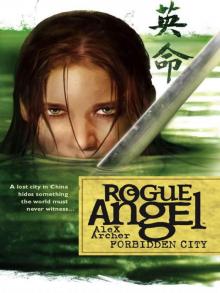 Rogue Angel: Forbidden City
Rogue Angel: Forbidden City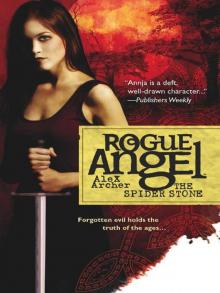 The Spider Stone
The Spider Stone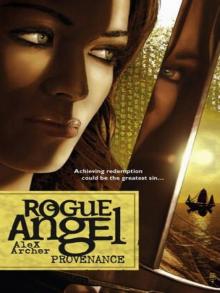 Provenance
Provenance Blood Cursed
Blood Cursed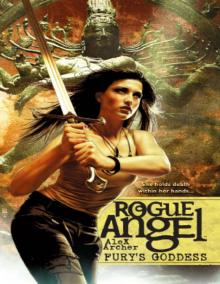 Fury's Goddess
Fury's Goddess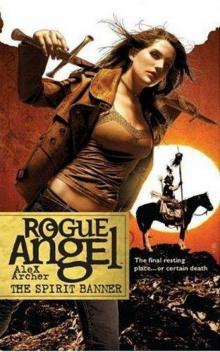 The Spirit Banner
The Spirit Banner Footprints
Footprints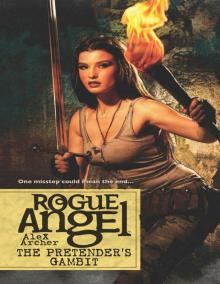 The Pretender's Gambit
The Pretender's Gambit Rogue Angel: The Lost Scrolls
Rogue Angel: The Lost Scrolls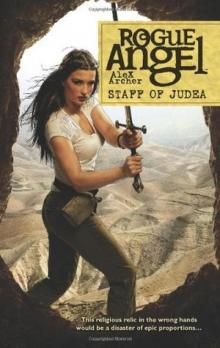 Staff of Judea
Staff of Judea Rogue Angel 55: Beneath Still Waters
Rogue Angel 55: Beneath Still Waters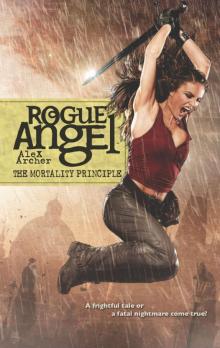 The Mortality Principle
The Mortality Principle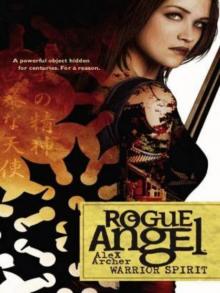 Warrior Spirit
Warrior Spirit Paradox
Paradox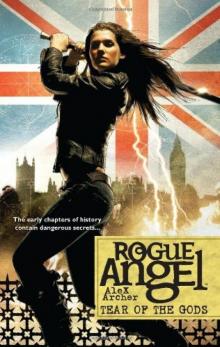 Tear of the Gods
Tear of the Gods Forbidden City
Forbidden City River of Nightmares (Rogue Angel)
River of Nightmares (Rogue Angel)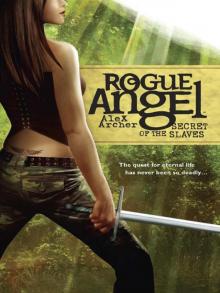 Rogue Angel: The Secret of the Slaves
Rogue Angel: The Secret of the Slaves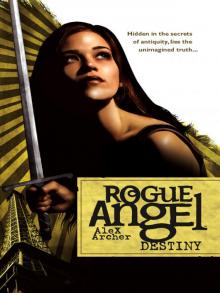 Destiny
Destiny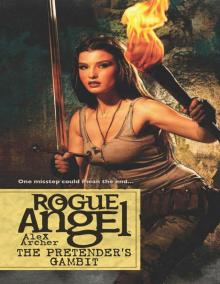 Rogue Angel 51: The Pretender's Gambit
Rogue Angel 51: The Pretender's Gambit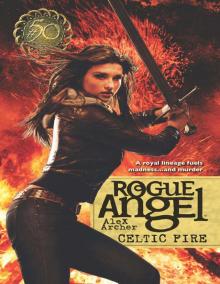 Celtic Fire
Celtic Fire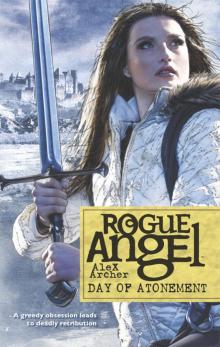 Rogue Angel 54: Day of Atonement
Rogue Angel 54: Day of Atonement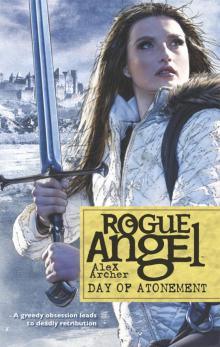 Day of Atonement
Day of Atonement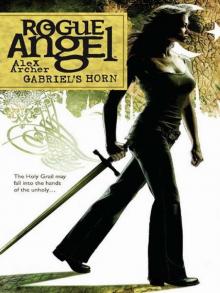 Rogue Angel: Gabriel's Horn
Rogue Angel: Gabriel's Horn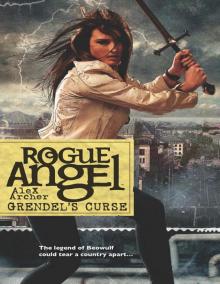 Grendel's Curse
Grendel's Curse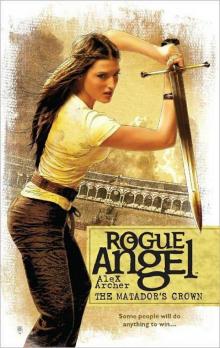 The Matador's Crown
The Matador's Crown Rogue Angel: The Chosen
Rogue Angel: The Chosen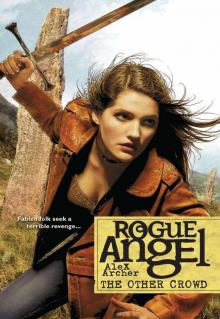 The Other Crowd
The Other Crowd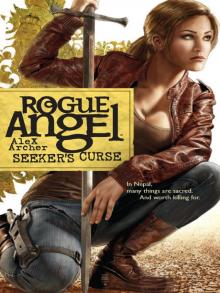 Seeker’s Curse
Seeker’s Curse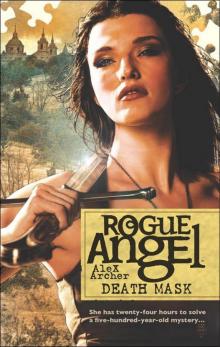 Rogue Angel 52: Death Mask
Rogue Angel 52: Death Mask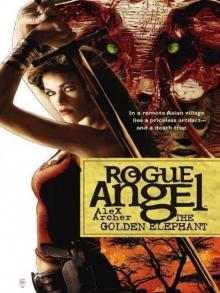 The Golden Elephant
The Golden Elephant Blood Cursed (Rogue Angel)
Blood Cursed (Rogue Angel)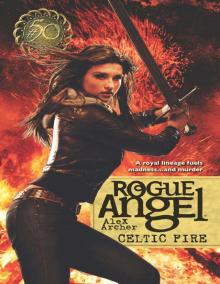 Celtic Fire (Rogue Angel)
Celtic Fire (Rogue Angel)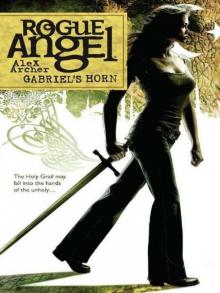 Gabriel's Horn
Gabriel's Horn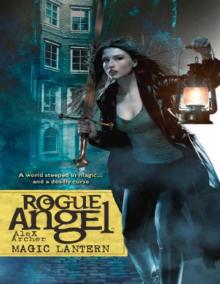 Magic Lantern (Rogue Angel)
Magic Lantern (Rogue Angel)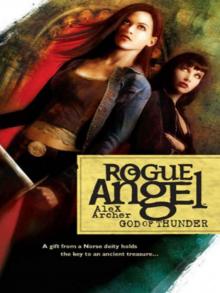 God of Thunder
God of Thunder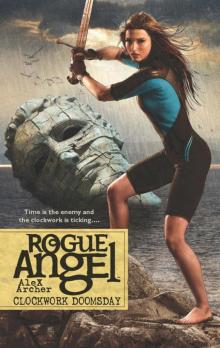 Clockwork Doomsday
Clockwork Doomsday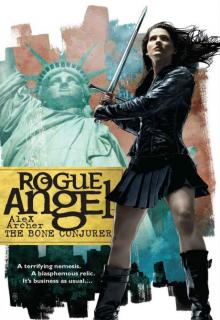 The Bone Conjurer
The Bone Conjurer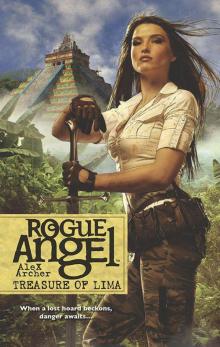 Treasure of Lima
Treasure of Lima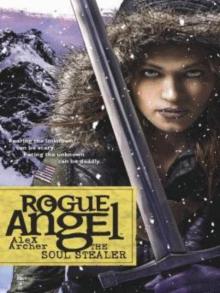 The Soul Stealer
The Soul Stealer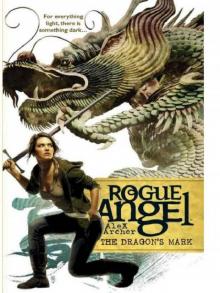 The Dragon’s Mark
The Dragon’s Mark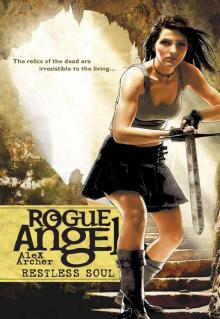 Restless Soul
Restless Soul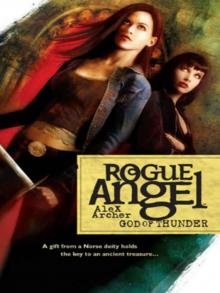 Rogue Angel: God Of Thunder
Rogue Angel: God Of Thunder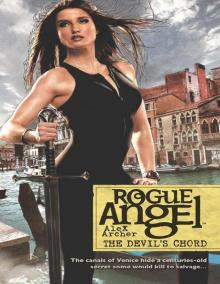 Rogue Angel 49: The Devil's Chord
Rogue Angel 49: The Devil's Chord Death Mask
Death Mask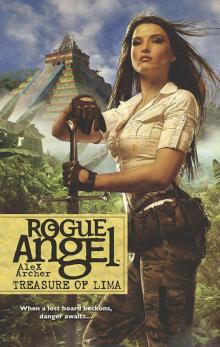 Rogue Angel 46: Treasure of Lima
Rogue Angel 46: Treasure of Lima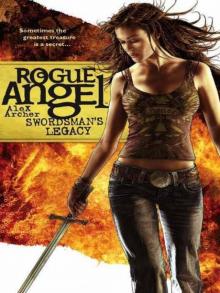 Swordsman's Legacy
Swordsman's Legacy The Oracle's Message
The Oracle's Message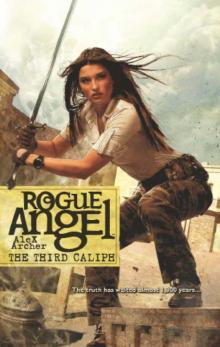 The Third Caliph
The Third Caliph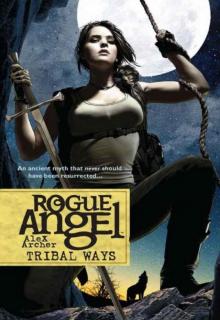 Tribal Ways
Tribal Ways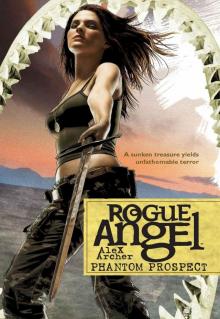 Phantom Prospect
Phantom Prospect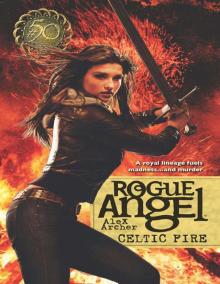 Rogue Angel 50: Celtic Fire
Rogue Angel 50: Celtic Fire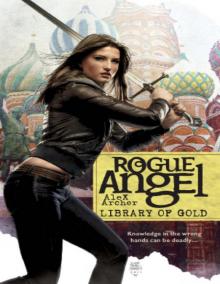 Library of Gold
Library of Gold Rogue Angel 53: Bathed in Blood
Rogue Angel 53: Bathed in Blood Sacred Ground
Sacred Ground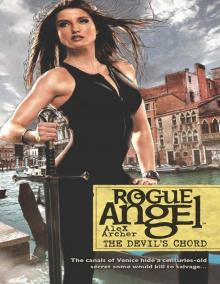 The Devil's Chord
The Devil's Chord Serpent's Kiss
Serpent's Kiss The Vanishing Tribe
The Vanishing Tribe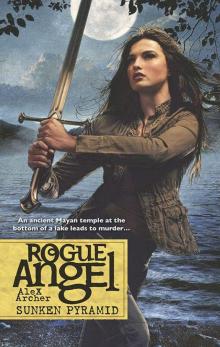 Sunken Pyramid
Sunken Pyramid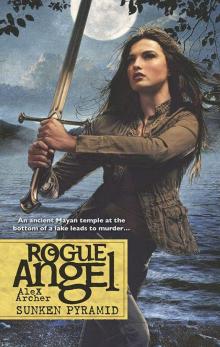 Sunken Pyramid (Rogue Angel)
Sunken Pyramid (Rogue Angel)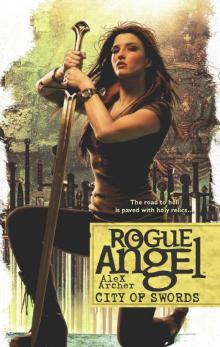 City of Swords
City of Swords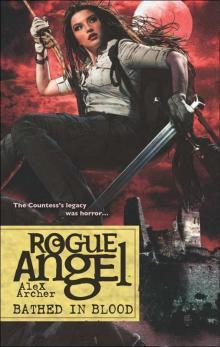 Bathed in Blood
Bathed in Blood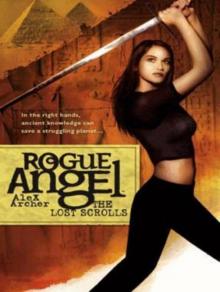 The Lost Scrolls
The Lost Scrolls The Babel Codex
The Babel Codex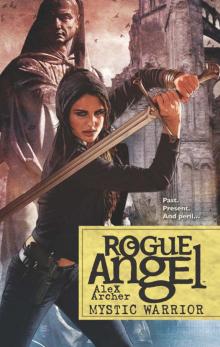 Mystic Warrior
Mystic Warrior Eternal Journey
Eternal Journey Beneath Still Waters
Beneath Still Waters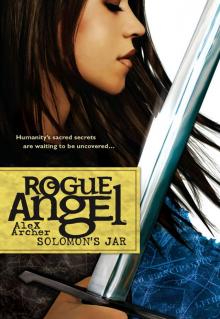 Solomon's Jar
Solomon's Jar Beneath Still Waters (Rogue Angel Book 55)
Beneath Still Waters (Rogue Angel Book 55) Cradle of Solitude
Cradle of Solitude Secret of the Slaves
Secret of the Slaves River of Nightmares
River of Nightmares Polar Quest
Polar Quest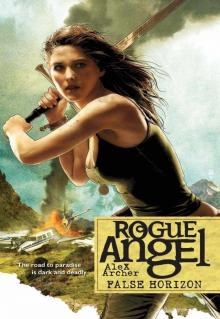 False Horizon
False Horizon